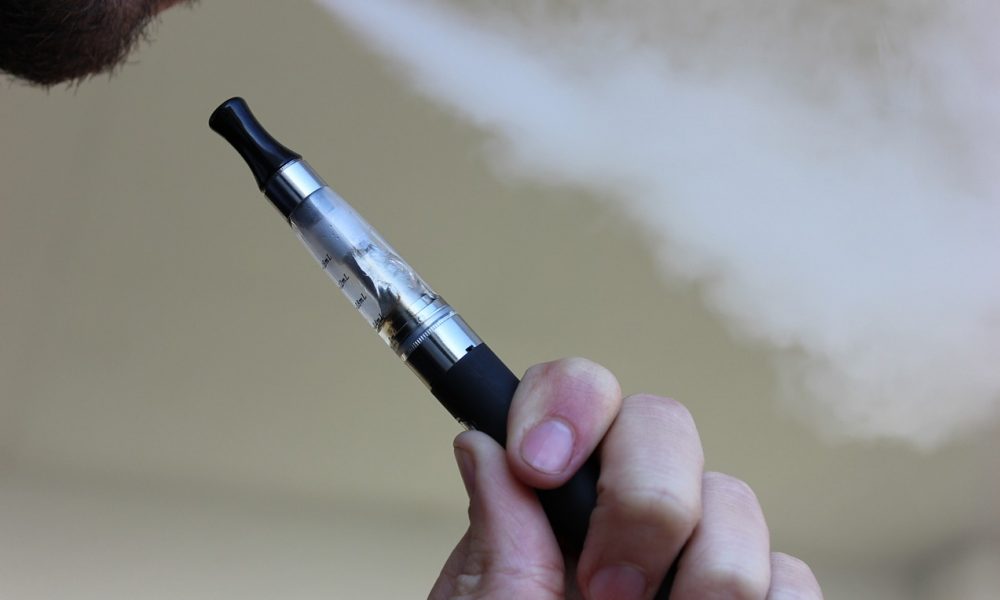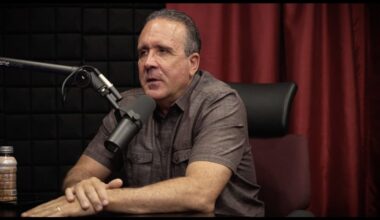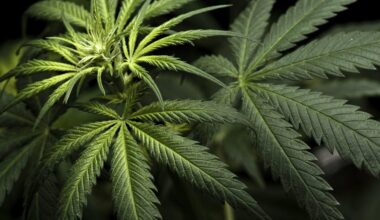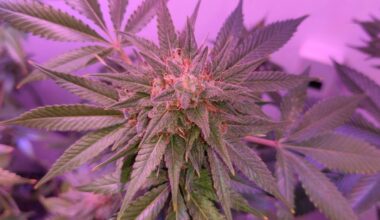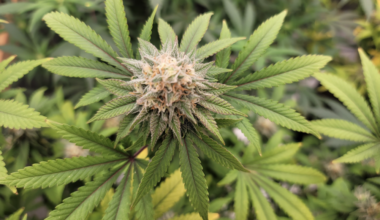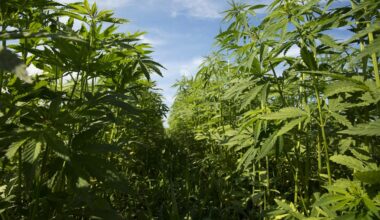[ad_1]
The federal legalization of hemp through the 2018 Farm Bill removed restrictions on a wide range of molecules produced by the cannabis plant—including, a new court ruling says, the psychoactive cannabinoid delta-8 THC.
A panel of the U.S. Court of Appeals for the Ninth Circuit wrote in an opinion published Thursday that products containing delta-8 THC are generally legal because federal law defines hemp as “any part of” the cannabis plant, including “all derivatives, extracts, [and] cannabinoids,” that contains less than 0.3 percent delta-9 THC by weight.
The law, the court said in the 3-0 ruling, “is silent with regard to delta-8 THC.”
Delta-9 THC, often referred to simply as THC, is the most abundant psychoactive cannabinoid in marijuana and remains federally illegal, classified as a Schedule I controlled substance. By contrast, Delta-8 THC typically occurs in only trace amounts in the cannabis plant.
Current cultivation and manufacturing techniques, however, allow for so-called minor cannabinoids to be concentrated from hemp plants and refined into consumer products. And delta-8 THC products have surged in popularity in recent years, especially in states where marijuana remains illegal.
Like its more famous counterpart, delta-8 THC also has psychoactive properties, although proponents say the experience is generally more subdued and has gentler side effects than delta-9 THC. Health officials and even some advocates of marijuana legalization, however, say far less is known about the health impacts or potential risks of delta-8 THC.
The Ninth Circuit panel, for its part, noted that although delta-8 THC has “psychoactive and intoxicating effects,” it falls within federal law’s definition of hemp and is therefore legal.
“Regardless of the wisdom of legalizing delta-8 THC products, this Court will not substitute its own policy judgment for that of Congress,” Judge D. Michael Fisher wrote for the three-judge panel, which also included Judges Andrew Kleinfeld and Mark Bennett. All three were appointed by Republican presidents.
If lawmakers inadvertently created a loophole and didn’t intend to legalize psychoactive substances such as delta-8 THC, Fisher said, “then it is for Congress to fix its mistake.”
Oral argument in the case took place in March.
The Ninth Circuit ruling stems from a dispute over alleged trademark and copyright infringement that hinged on delta-8 THC’s legality. In it, AK Futures, which manufactures e-cigarettes and vaping products, claimed that a Los Angeles company, Boyd Street Distro, had been selling counterfeit versions of its branded products that contain delta-8 THC.
Boyd Street Distro responded that the trademark and counterfeit claims were invalid on the grounds that delta-8 THC is federally illegal. But in its opinion this week, the Ninth Circuit panel disagreed, upholding a lower court’s preliminary injunction against Boyd Street Distro.
“The record on appeal convinces us that AK Futures’ delta-8 THC products are lawful under the plain text of the Farm Act and may receive trademark protection,” the new opinion concludes.
For its part, Boyd Street said in the case that it purchased the products from a person who said they were an authorized dealer of the brand. The company has already sold its entire inventory of the products in question, it claimed in court, and has “no plans” to sell the brand in the future.
Darrel Menthe, a lawyer for Boyd Street, told the San Francisco Chronicle that he had seen no evidence that Congress had intended to legalize delta-8 THC. If products containing the cannabinoid are deemed broadly legal, he predicted, “federal and state governments will probably get in the business of making sure it’s safe and not marketed to children.”
Menthe said Boyd Street had no immediate plans to appeal the decision.
Dale Gieringer, NORML’s California director, told the Chronicle that it would make more sense from a policy perspective to simply legalize delta-9 THC, which he said “has been studied exhaustively in thousands of subjects and research protocols over the decades.”
Following the passage of the 2018 farm bill, delta-8 THC and some other minor cannabinoids entered a sort of legal gray area. Many businesses in the hemp industry insisted the products were legal, but officials in many jurisdictions disagreed.
The issue is increasingly bubbling up to the federal level. Earlier this month, the Food and Drug Administration (FDA) issued its first set of warning letters to companies over the allegedly illegal sale of products containing delta-8 THC.
FDA previously released a notice cautioning consumers about such products, similar to how the agency has sent warning letters to certain businesses over unauthorized marketing around CBD.
FDA rules currently don’t allow for the marketing of cannabinoids in the food supply, though lawmakers and advocates have been pushing the agency to craft regulations permitting such activity for CBD since hemp was federally legalized.
Congressional lawmakers from both parties have been pushing FDA to develop rules on CBD. But during a U.S. House committee hearing on Thursday, FDA Commissioner Dr. Robert M. Califf said he needs more support from Congress to do so.
“I don’t think the current authorities we have on the food side or the drug side necessarily give us what we need to have to get the right pathways forward,” the commissioner said.
The Drug Enforcement Administration, meanwhile, signaled late last year that delta-8 THC was legal.
In Texas last year, the state government said delta-8 THC was illegal—a move that opponents challenged in court, securing a pause on state enforcement of the ban.
Image courtesy of Lindsay Fox from Pixabay.
[ad_2]
Source link
Medical Disclaimer:
The information provided in these blog posts is intended for general informational and educational purposes only. It is not a substitute for professional medical advice, diagnosis, or treatment. Always seek the advice of your physician or other qualified healthcare provider with any questions you may have regarding a medical condition. The use of any information provided in these blog posts is solely at your own risk. The authors and the website do not recommend or endorse any specific products, treatments, or procedures mentioned. Reliance on any information in these blog posts is solely at your own discretion.
